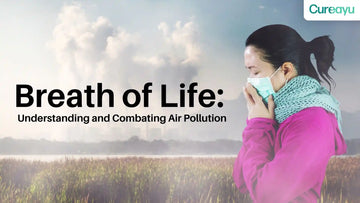Air pollution, or the presence of harmful and toxic substances in the Earth’s atmosphere, remains a global concern due to its profound impact on human health and the environment. Let’s delve into the causes and consequences of air pollution and explore effective measures for its prevention and control.
Causes of Air Pollution
- Construction Activities: Dust and emissions from construction equipment contribute to localized air pollution.
- Deforestation: Altering land use and cutting down forests release stored carbon, leading to air pollution and climate change.
- Industrial Activities: Factories emit various pollutants, including sulfur dioxide (SO2), volatile organic compounds (VOCs), and particulate matter.
- Improper Waste Disposal: Landfills produce methane, while open burning releases harmful substances into the atmosphere.
- Vehicle Emissions: Combustion engines in vehicles release pollutants such as carbon monoxide and nitrogen oxides, with diesel vehicles producing particulate matter (PM).
- Agricultural Practices: The use of fertilizers and pesticides releases ammonia and VOCs into the air.
Also Read: Benefits of Exercise: Understanding the Importance of Physical Fitness
Effects of Air Pollution on Human Health
- Irritation of Eyes and Throat: Short-term exposure to pollutants like particulate matter and sulfur dioxide can cause eye and throat irritation.
- Immune System Impact: Air pollution weakens the immune system, making individuals more susceptible to infections and diseases.
- Cardiovascular Complications: Long-term exposure to air pollution is associated with an increased risk of heart diseases, including heart attacks and strokes.
- Respiratory Issues: Air pollution leads to respiratory problems such as coughing, wheezing, shortness of breath, and exacerbates pre-existing conditions like asthma and bronchitis.
- Neurological Effects: Emerging research suggests that air pollution may adversely affect cognitive function and may be linked to neurological conditions like Alzheimer’s disease.
Effects of Air Pollution on the Environment
- Climate Change: Air pollution contributes to global warming by releasing greenhouse gases like carbon dioxide (CO2) and methane (CH4), trapping heat in the atmosphere and causing rising temperatures.
- Damage to Vegetation: Pollutants like sulfur dioxide harm vegetation, leading to leaf damage and reduced crop yields, with economic implications for agriculture.
- Harm to Wildlife: Air pollution impacts wildlife health and habitats, affecting various species, including birds, insects, and aquatic life.
- Soil Contamination: Air pollution introduces toxins and heavy metals into the soil, making it less fertile and potentially hazardous to plants and animals.
- Ozone Depletion: Some air pollutants, such as chlorofluorocarbons (CFCs), can lead to the depletion of the ozone layer, which shields the Earth from harmful ultraviolet (UV) radiation.
Also Read: Overcoming Anxiety Naturally: Causes, Treatment, and Herbal Medicines Unveiled
Prevention and Control of Air Pollution
- Awareness and Education: Public education about the causes and consequences of air pollution fosters responsible behavior and support for cleaner practices.
- Emission Reduction Technologies: Implementing advanced technologies in industries, vehicles, and power plants is crucial for reducing pollutant emissions and preventing air pollution.
- Reforestation: Planting trees helps absorb carbon dioxide, mitigating air pollution and supporting cleaner air.
- Public Transportation: Encouraging public transit, carpooling, and biking reduces the number of vehicles on the road, curbing pollution.
- Incentives and Subsidies: Providing incentives for green technologies and renewable energy adoption encourages pollution reduction.
By adopting these prevention and control measures, society can take significant steps toward reducing air pollution and safeguarding human health and the environment. It’s high time we address the causes and effects of air pollution to ensure a cleaner and healthier future for generations to come.








